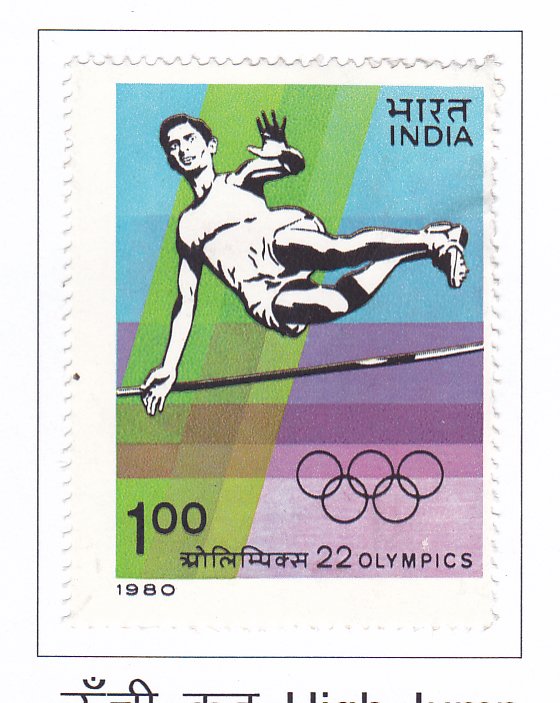Olympic Games – High Jump

Technical Data
| Stamp Set | Olympic Games |
|---|---|
| Date of Issue | July 19, 1980 |
| Denomination | Rs. 1 |
| Quantity | 2,000,000 |
| Perforation | comb 13½ x 14 |
| Printer | Security Printing Press, Nashik |
| Watermark | No Watermark |
| Colors | Multicolor |
| Catalog Codes |
Michel IN 834 Stamp Number IN 868 Yvert et Tellier IN 632 Stanley Gibbons IN 974 Phila-India IN 822 |
| Themes | Athletes | Athletics | High Jump | Olympic Games | Sports |
The origin of the Olympic Games is steeped in ancient history, with various traditions attributing its inception to different legends. According to one account, the inaugural race was between Pelops and Oenomaus, while another credits Heracles. Historically, the first recorded celebration of the games dates back to 776 B.C., with Coroebus of Elis emerging as the victor, a moment often cited by ancient authors for dating purposes.
Located in Olympia, Greece, the festival occurred every four years during high summer, coinciding with the full moon. A sacred truce was declared, allowing safe passage to all, even in times of war. Such was the significance of the games that time was measured by the four-year interval between them, termed an “Olympiad.”
Participation in the early games was initially restricted to Greeks, but competitors eventually hailed from all Greek colonies. The victor’s prize was a crown of wild olive, crafted from the tree known as “the olive of the fair crown,” which grew behind the temple of Zeus, one of the largest Doric temples in Greece. Kings competed alongside commoners, with even Roman Emperor Nero seeking Olympic honors.
The Olympic Games were halted circa A.D. 393 by the Roman emperor Theodosius I following Greece’s loss of independence. However, they were revived in the modern era through the efforts of Baron Pierre de Coubertin of France. The first modern Olympiad took place in 1896 in Athens under the patronage of the King of Greece. Since then, subsequent games have been held in various cities worldwide, including Paris, St. Louis, London, Stockholm, Antwerp, Amsterdam, Los Angeles, Berlin, and others.
The games scheduled for the VI, XII, and XIII Olympiads in 1916, 1940, and 1944 were not held due to war. The Indian Posts and Telegraphs Department commemorates the XXII Olympics by issuing a set of two stamps, recognizing the enduring legacy of the Games in promoting international cooperation and sporting excellence.
